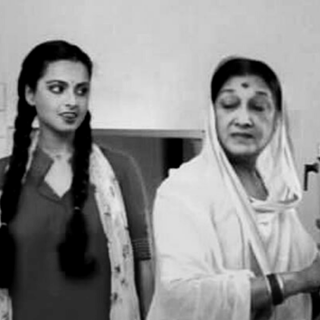
Can We Move On? From the Lady Cop Trope That Shows a Male‑Centric Idea of an Empowered Woman
With her slaps and lathi-charges, Bollywood’s female cop takes violence against women personally – and hides the structural forces behind it.

In Can We Move On, we revisit old tropes and question whether they have any remaining cultural relevance.
Bollywood’s cop dramas almost always mean extra-muscular heroes with pithy one-liners and a hefty action choreography budget. However, a new breed of films with policewomen as protagonists is slowly on the upswing. Though the female cop drama doesn’t pull half the audience of a blockbuster brimming with testosterone, her righteously creased brow and indignant slaps embody the same ethos towards crime that a male cop does. Mardaani, the most recent popular film series to centre a woman cop, literally means “like a man.”
Female cop movies in Bollywood inevitably end up directly or indirectly dealing with violent sex crimes. This doesn’t serve to encourage confidence or sisterhood among women but instead puts the female cop on a pedestal that other women can be judged against. Just like the male cop rescues a female victim to reassert his masculinity, the female cop rescues women to cement her position as an empowered woman. The female cop essentially represents an ideal response to sexual violence: that of a young woman who exhibits superhuman strength and clearheadedness in her quest for revenge against anyone who dares to think he can violate women.
This trend has shown up in several films over the past few decades. In Mardaani and Mardaani 2, Shivani Roy (Rani Mukherjee) solves cases involving a child sex-trafficking ring and a serial rapist, respectively. In Drishyam, Meera Deshmukh (Tabu) investigates the disappearance of her son, who records without consent the protagonist’s daughter taking a shower. In Jai Gangajaal, Abha Mathur (Priyanka Chopra) deals with a young woman’s molestation and the rape and murder of another. This particular trend was prevalent as far back as the 80s, with Andha Kanoon, in which Durga Devi Singh (Hema Malini) is a police officer seeking justice for a family tragedy that involves rape.
Bollywood cop dramas also tend to be retributive and personal, making the problem — be it corruption or trafficking — a personal one rather than a structural one. This trend is even more prevalent in films about female cops, as almost all of the above film examples involve the antagonist causing personal struggles to the protagonist trying to solve the case. Due to this, when the female cop doles out punitive justice, she becomes a stand-in for the survivor fighting back against someone who wronged her, rather than the state punishing a perpetrator. Unfortunately, this means no matter how often a Shivani belts a rapist, or an Abha lathi-charges a molester, the fear and authority of a powerful individual does not really reduce instances of sexual violence or put fear in rapists’ hearts. All it does is inspire young women to think that rape only happens to ‘weak’ women, rather than strong, empowered women — which is completely untrue.
Related on The Swaddle:
Women Officers Face Systemic Sexism in the Indian Police Force. Here’s How to Change That.
The beginning of a recent wave of female cops in positions of power (Mardaani, Delhi Crime) dates to the Nirbhaya rape case — well known as a turning point in India’s perceptions of violence against women. As more and more brutal gang rapes splashed across the news, national discourse continued to revolve around what punitive measures could put an end to India’s growing rape problem. Some solutions put forth included the death penalty and self-defense training for women. The logic is obvious — if a woman does a traditionally male, violent thing, her male perpetrator backs away.
The problem with narratives like the strong, empowered woman fighting back against perpetrators who deserve to die is that it completely discounts who perpetrators of sexual assault are. More often than not, perpetrators are close friends, family, spouses and other individuals known to the survivor. Beating up the abuser or reporting him to a system willing to kill him is a lot harder when the abuser is a family friend who can ruin the family’s reputation or a partner who turned violent. Plus, when self-defense becomes the policy solution to rape, it becomes yet another means to judge a survivor’s character and deny justice to her — both in public opinion and in courts.
The female cop drama then becomes a retributive fantasy for any individual who finds sexual violence morally repugnant, minus any real reflection on what a traumatized woman’s real condition might be after an assault. This way, the film industry continues to feed the audience’s bloodthirst, all while giving itself a gold star for woman’s empowerment.
Related on The Swaddle:
We Need to Stop Confusing Punishment With Justice
The female cop is a figure of empowerment that is a facsimile of masculine posturing. But as the world (and India) takes a position against unjust police violence, more and more people find themselves questioning the retributive justice enacted so conveniently — both in reel in real life.
But luckily, reel narratives are beginning to show a glimmer of change. In Delhi Crime — a web series inspired by the Nirbhaya rape — a young officer named Neeti (Rasika Dugal) stands out amid the growing public outrage and demands for punitive justice because she prioritizes the survivor’s well-being over harming the alleged rapists in custody. In the season finale, she tells her boss, “Everyone’s celebrating but I just feel like saying ‘Fuck this investigation!’ The statements, court cases. I just want Deepika to be okay.”
Maybe this sentiment isn’t empowerment the way a punishment-focused society envisions it, but Neeti and her behavior definitely serve as a far better feminist role model than her bloodthirsty, retributive predecessors.
Aditi Murti is a culture writer at The Swaddle. Previously, she worked as a freelance journalist focused on gender and cities. Find her on social media @aditimurti.
Related


India Has a Toxic Masculinity Crisis. How Do We Detox It?
